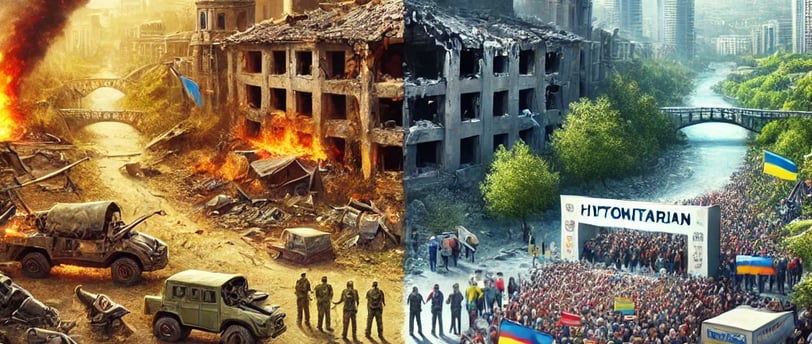The Ukraine-Russia War: A Comprehensive Analysis
Read to understand what is really going on in Ukraine.
1/10/20253 min read


The ongoing conflict between Ukraine and Russia has profoundly impacted the global political landscape, reshaping alliances and highlighting the resilience of the human spirit. This article delves into the origins, progression, and implications of the war, shedding light on its far-reaching consequences.
Historical Context
The roots of the Ukraine-Russia conflict can be traced back to Ukraine’s independence following the dissolution of the Soviet Union in 1991. Ukraine's strategic position and resources made it a focal point of geopolitical interests. The situation escalated in 2014 when Russia annexed Crimea, citing the protection of ethnic Russians as justification. This move was widely condemned as a violation of international law and marked the beginning of heightened tensions.
In 2021-2022, these tensions erupted into full-scale war. Russia launched a military invasion of Ukraine on February 24, 2022, under the pretext of "demilitarization" and "denazification." The international community, led by NATO and the European Union, condemned the invasion and imposed sweeping sanctions on Russia.
Key Events in the Conflict
1. Initial Invasion and Resistance:
- Russia’s rapid invasion aimed to capture Kyiv and install a pro-Russian government. However, the Ukrainian Armed Forces and civilian volunteers mounted a staunch resistance, supported by military aid from Western countries.
2. International Sanctions and Diplomacy:
- Countries worldwide imposed sanctions targeting Russian financial systems, energy exports, and key industries. The isolation of Russia from global markets has been a significant aspect of the international response.
3. Battle for Donbas and Southern Ukraine:
- The Donbas region and southern Ukraine became key battlegrounds. Cities like Mariupol and Bakhmut witnessed devastating destruction, symbolizing the brutality of the war.
4. Humanitarian Crisis:
- Millions of Ukrainians were displaced, creating Europe’s largest refugee crisis since World War II. The war’s toll on civilians—including loss of life, infrastructure damage, and economic collapse—has been catastrophic.
Global Implications
The Ukraine-Russia war has had profound implications for global politics, economics, and security.
1. Energy Crisis:
- Europe’s reliance on Russian gas has exposed vulnerabilities, prompting a shift towards renewable energy and alternative suppliers. This energy pivot has accelerated debates about energy independence.
2. Geopolitical Alliances:
- NATO’s unity has strengthened, with countries like Finland and Sweden moving to join the alliance. The war has also underscored the importance of collective security in deterring aggression.
3. Economic Repercussions:
- Sanctions on Russia have disrupted global trade and contributed to inflation and supply chain challenges. Meanwhile, Ukraine’s economy has been severely crippled, requiring international aid for recovery.
4. Shifts in Military Strategy:
- The war has highlighted the importance of modern military technology, including drones, cyber warfare, and precision-guided munitions, reshaping future military doctrines.
Humanitarian Efforts and the Road to Recovery
The resilience of the Ukrainian people has been matched by a surge in global humanitarian aid. Non-governmental organizations, countries, and individuals have rallied to provide shelter, medical aid, and financial support to those affected.
Long-term recovery will require significant investments in rebuilding infrastructure, reviving the economy, and addressing psychological trauma. International organizations like the United Nations and the World Bank are expected to play pivotal roles in Ukraine’s reconstruction.
The Path Ahead
While the war rages on, diplomatic solutions remain elusive. Ukraine continues to demand territorial integrity and sovereignty, while Russia seeks to solidify its territorial gains. The international community’s role in mediating peace talks and ensuring justice for war crimes will be critical.
As the conflict evolves, the courage of those on the frontlines and the support of the global community remain beacons of hope. The Ukraine-Russia war serves as a stark reminder of the fragility of peace and the enduring human cost of war.
Conclusion
The Ukraine-Russia war is a defining conflict of the 21st century, with lessons for nations and leaders worldwide. Its resolution will shape the future of international law, security, and cooperation, leaving an indelible mark on history. For now, the focus remains on supporting those impacted and striving for a peaceful resolution.
Awareness
Join us in raising awareness about injustices.
Action
Inspire
© 2024. All rights reserved.
